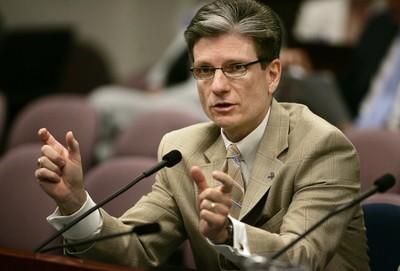Panel weighs ‘I’m sorry’ bill
CARSON CITY -- A Nevada Trial Lawyers Association lobbyist questioned Friday whether for-profit medical insurance companies ever will let doctors admit to patients that they botched operations.
"It boils down to money," lawyer Bill Bradley said. "If insurance companies treated people fairly, I'd be out of a job."
He testified against Senate Bill 174, which would allow a physician to make an expression of "apology, regret, sympathy, commiseration, condolence or compassion" to a patient or his family. That statement, under the bill, could not be used later against the doctor in a court case.
Dubbed the "I'm sorry" law and patterned after legislation in 29 states, the bill was approved by the Senate on a 16-5 vote April 12.
"I oppose it when any professional can say something and a year later not be held accountable for that statement on the witness stand," Bradley said. "If a physician truly feels there was an error, why not admit it and do something about it?"
Other concerns were expressed by legislators.
Assemblywoman Susan Gerhardt, D-Henderson, said the bill would allow physicians to say during malpractice trials that they did not tell patients they made medical errors -- even though they did -- and "that would be all right."
But the bill's sponsor, Sen. Joe Heck, R-Henderson, said the whole purpose of the legislation was to prevent doctors from having to repeat in court what they told their patients.
"I don't want to do anything to prohibit that type of question being asked on the stand," Gerhardt replied during an Assembly Judiciary Committee hearing.
She said Heck kept repeating that a doctor could say he made a "mistake" to a patient and that conversation could not be brought up in a court case.
"But nowhere in here (the bill) does it say the word 'mistake,' which is the word you are using," she told Heck.
No action was taken on the bill by Judiciary Chairman Bernie Anderson, D-Sparks.
Assemblyman William Horne, D-Las Vegas, questioned how a doctor could tell a patient he was sorry that he took the wrong kidney and then be protected from having that brought up in court.
In response, Las Vegas physician John Martin said a doctor would be "an idiot" if he admitted he removed the wrong kidney.
"A good plaintiff's attorney should be able to show you were negligent whether you admit it or not," said Martin, president of the Clark County OB-GYN Society.
Horne speculated that passage of the bill would lead others who commit negligent acts to seek immunity by saying "I'm sorry. ... "I'm sorry I sped through that red light and struck your car. I'm sorry I designed your home wrong."
But Heck, an emergency room physician, contended the bill does not prevent anyone from bringing a medical malpractice lawsuit.
He also said that the original version of the bill would have allowed a doctor to admit "fault" to a botched operation, but that word was removed. A doctor who said he was at fault to a patient could have that statement used against him in court, he said.
"I work in the emergency room and I have to say 'I'm sorry' quite a bit, especially when someone dies. 'I'm sorry, but we did all we could.' I am expressing compassion. But there have been cases where that phrase has been used against someone."
He said he has been sued three times in a 20-year career as a physician. Two of the lawsuits were dismissed quickly, Heck said.
"But in the other one, I made a mistake," he said.
He wanted to admit the mistake to the patient, but his insurance company told him not to say anything because "it would come back to haunt me."
Telling a patient "I'm sorry" improves their emotional outlook and helps in the recovery process, Heck said.
"What they want most is having someone say, 'I'm sorry' and this is what we are going to do to make sure it doesn't happen again."
Heck and other doctors might want to make a patient whole after a mistake, but Bradley said when it comes to doing something, "there is nobody who says 'We will help you with your medical bills, we will help you with your mortgage.' "
2007
Nevada Legislature






















